高中英语定语从句 课件(41张ppt)
图片预览

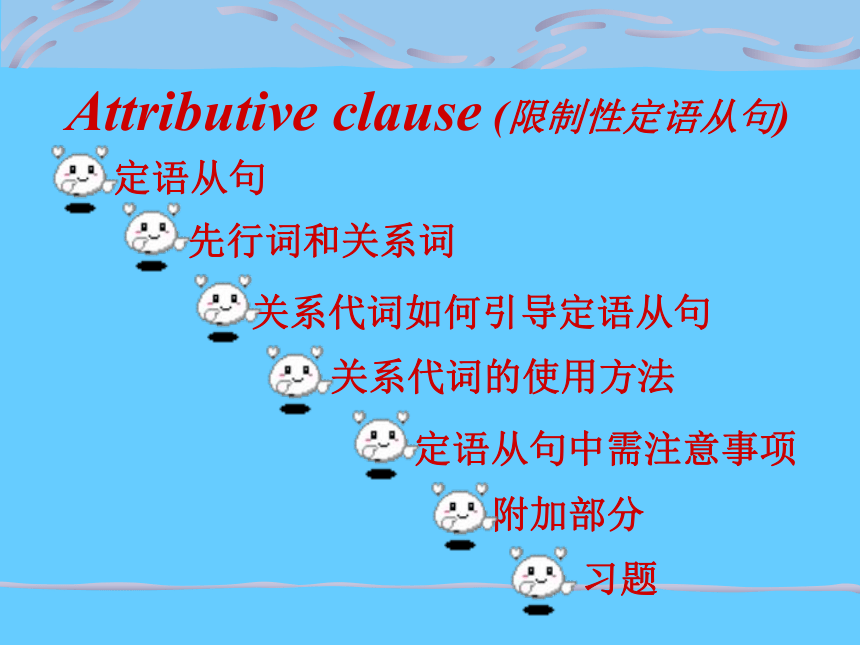
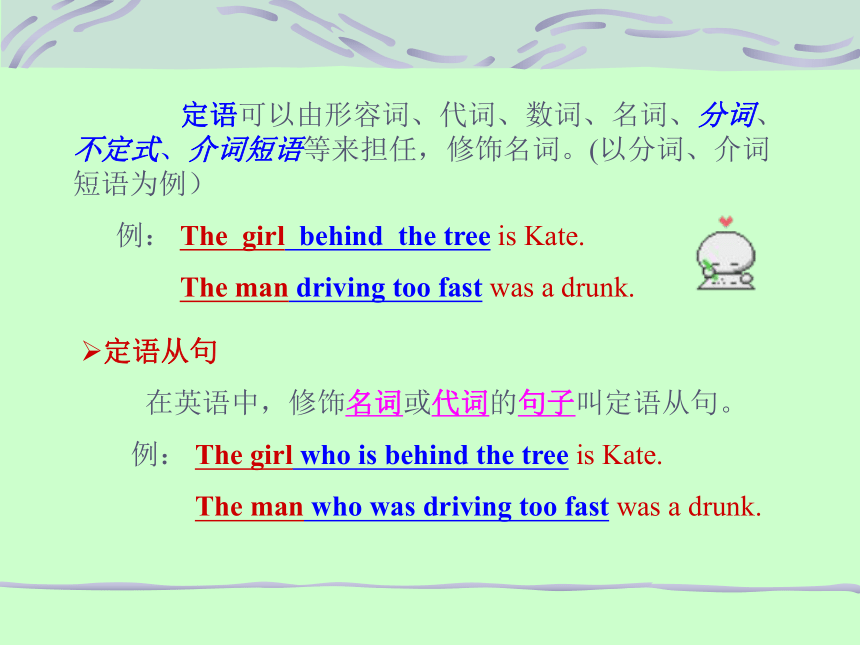
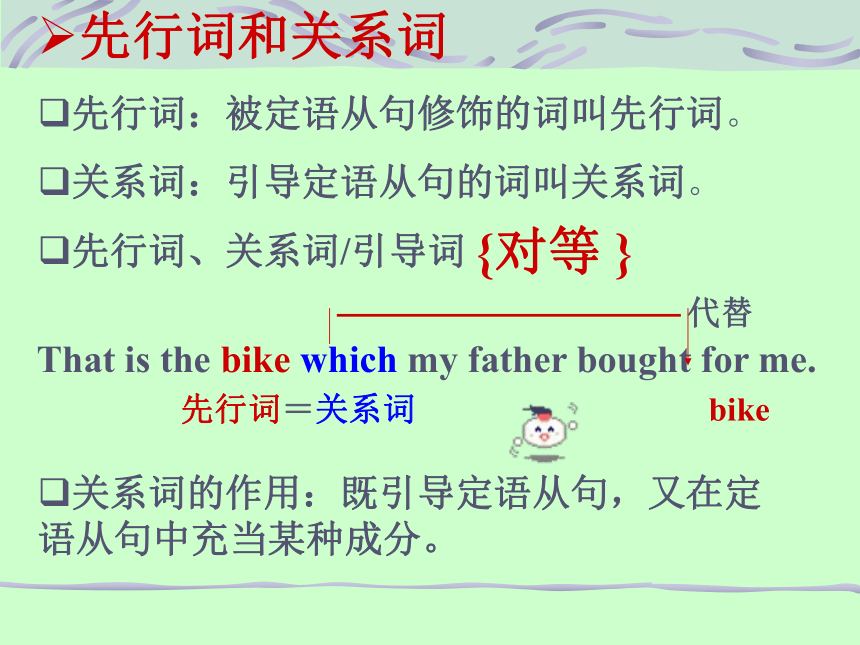
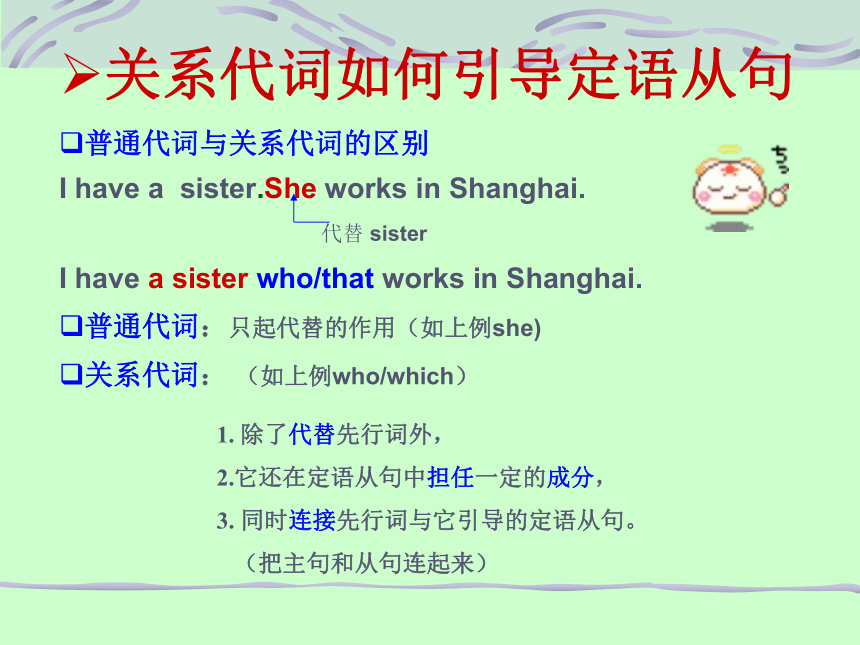
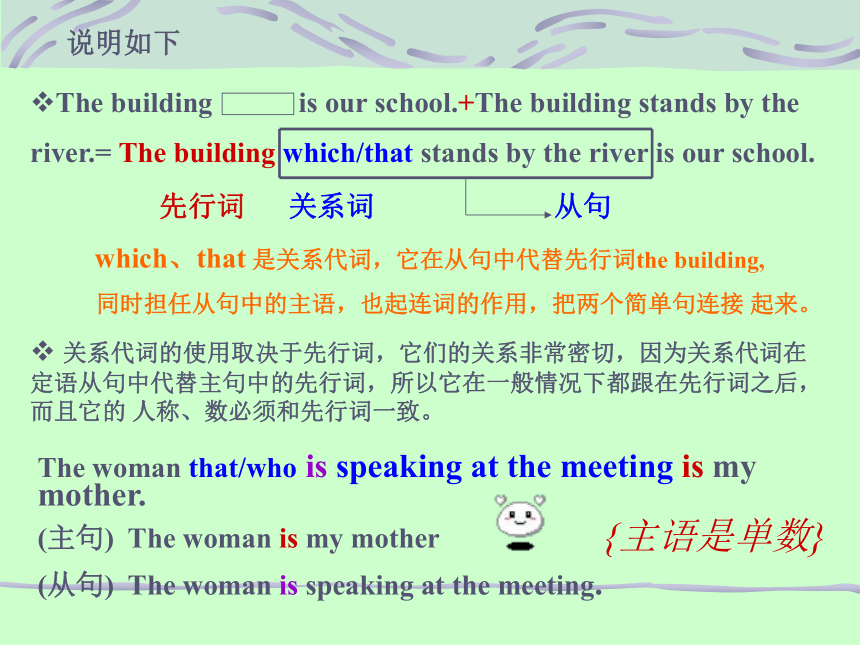

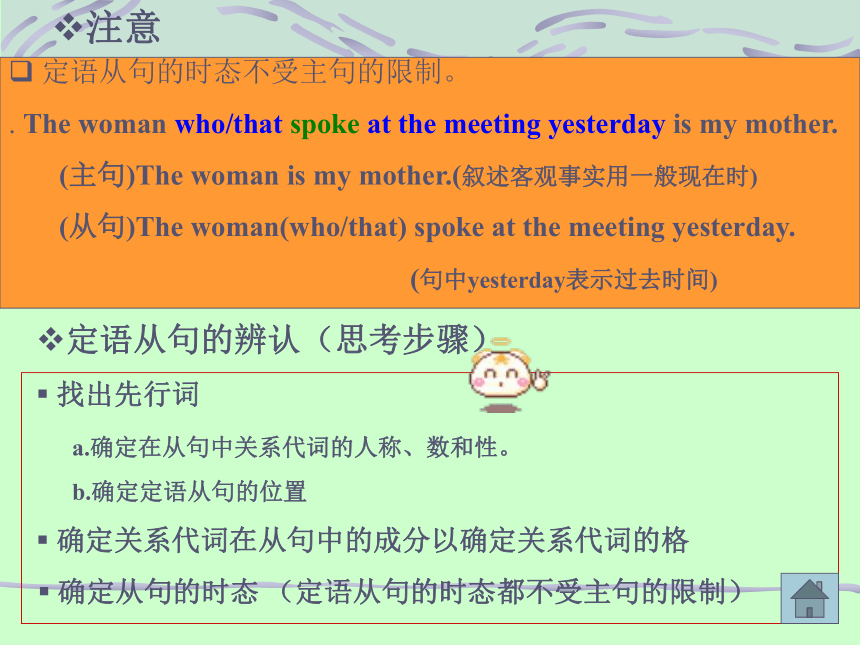
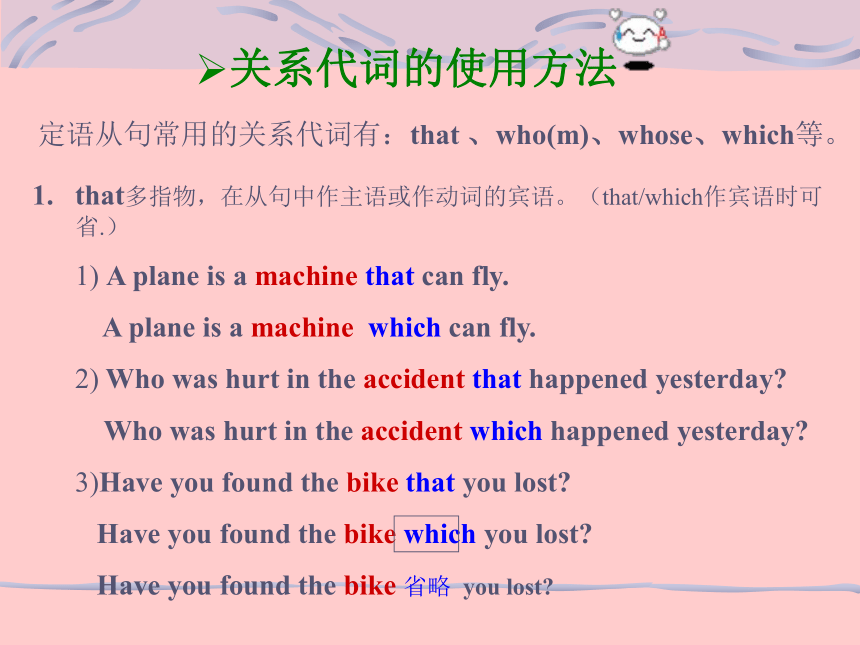
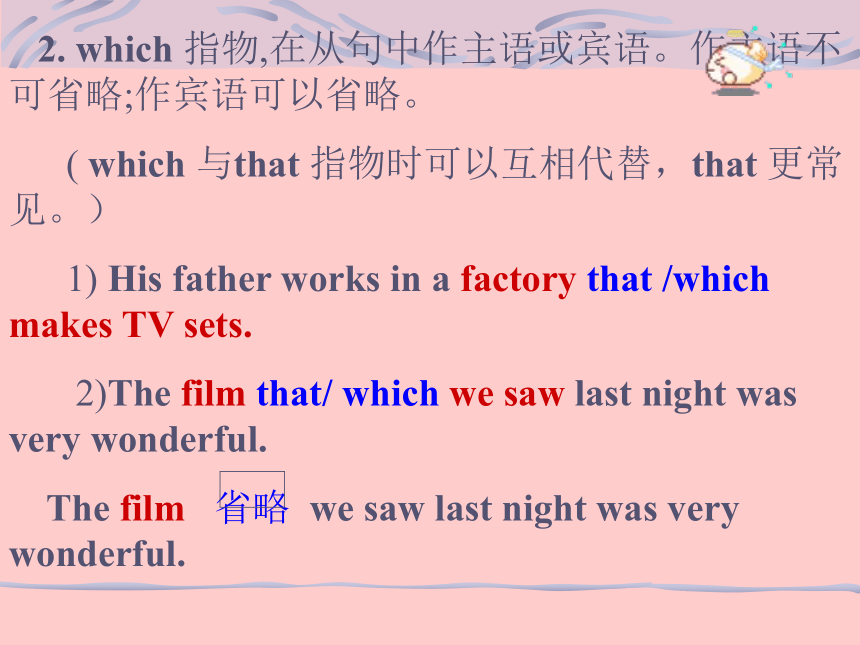
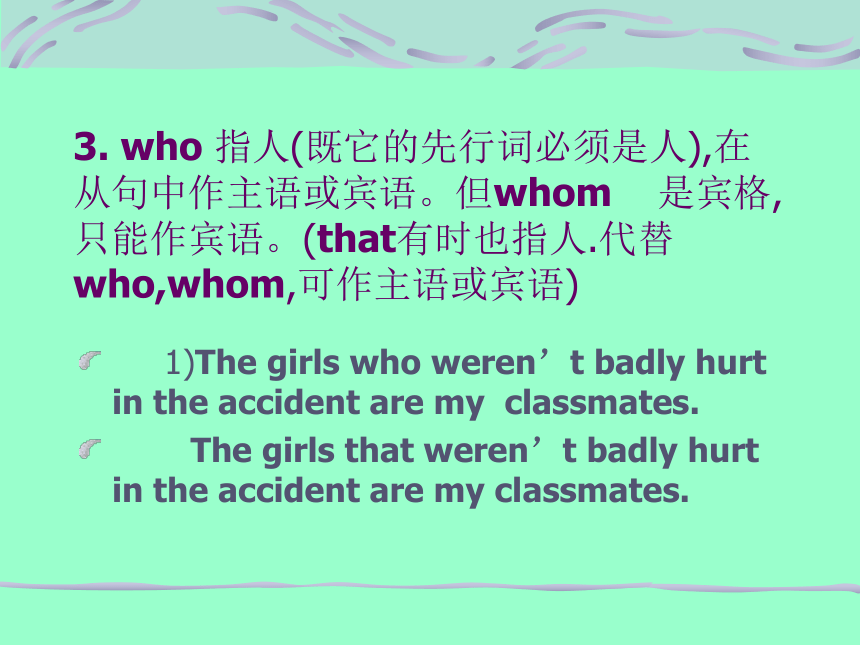
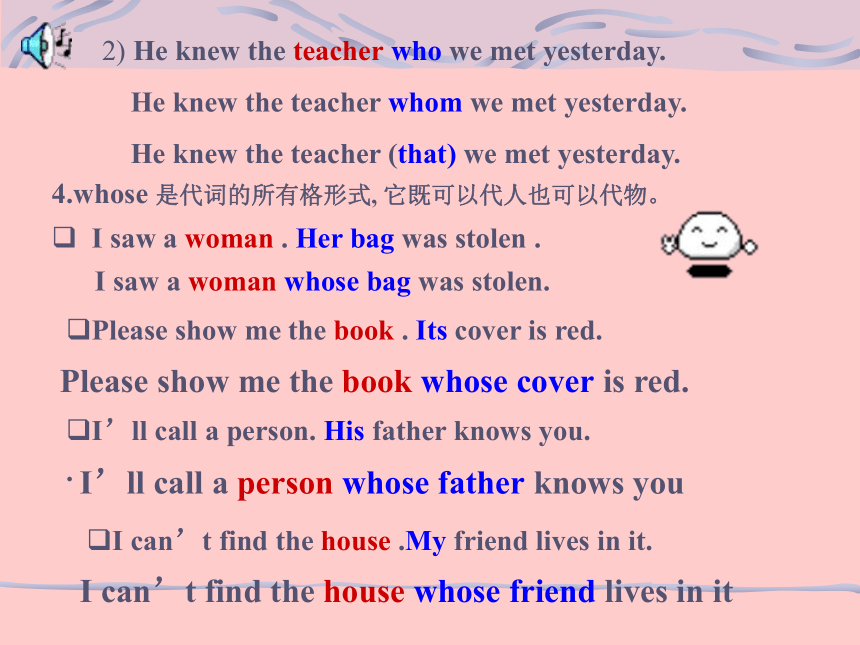
文档简介
(共41张PPT)
Grammar
Attributive
clause
(限制性定语从句)
先行词和关系词
定语从句
关系代词如何引导定语从句
关系代词的使用方法
定语从句中需注意事项
附加部分
习题
定语可以由形容词、代词、数词、名词、分词、不定式、介词短语等来担任,修饰名词。(以分词、介词短语为例)
例:
The
girl
behind
the
tree
is
Kate.
The
man
driving
too
fast
was
a
drunk.
定语从句
在英语中,修饰名词或代词的句子叫定语从句。
例:
The
girl
who
is
behind
the
tree
is
Kate.
The
man
who
was
driving
too
fast
was
a
drunk.
先行词和关系词
先行词:被定语从句修饰的词叫先行词。
关系词:引导定语从句的词叫关系词。
先行词、关系词/引导词
{对等
}
代替
That
is
the
bike
which
my
father
bought
for
me.
先行词=关系词
bike
关系词的作用:既引导定语从句,又在定
语从句中充当某种成分。
关系代词如何引导定语从句
普通代词与关系代词的区别
I
have
a
sister.She
works
in
Shanghai.
代替
sister
I
have
a
sister
who/that
works
in
Shanghai.
普通代词:只起代替的作用(如上例she)
关系代词:
(如上例who/which)
1.
除了代替先行词外,
2.它还在定语从句中担任一定的成分,
3.
同时连接先行词与它引导的定语从句。
(把主句和从句连起来)
说明如下
The
building
is
our
school.+The
building
stands
by
the
river.=
The
building
which/that
stands
by
the
river
is
our
school.
先行词
关系词
从句
which、that
是关系代词,它在从句中代替先行词the
building,
同时担任从句中的主语,也起连词的作用,把两个简单句连接
起来。
关系代词的使用取决于先行词,它们的关系非常密切,因为关系代词在定语从句中代替主句中的先行词,所以它在一般情况下都跟在先行词之后,而且它的
人称、数必须和先行词一致。
The
woman
that/who
is
speaking
at
the
meeting
is
my
mother.
(主句)
The
woman
is
my
mother
(从句)
The
woman
is
speaking
at
the
meeting.
{主语是单数}
The
women
that/who
are
speaking
at
the
meeting
are
famous
scientists.
(主句)The
women
are
famous
scientists.
(从句)The
women
are
speaking
at
the
meeting.
{主语是复数}
关系词判
断
步
骤
:
首先,要辨别出先行词。
如果先行词是指人,关系词可能就用
who,that,whom,whose。如果先行词指物,关系词可能用which或that
然后,要确定关系词在从句中的成分。请看下表
先行词
主格
宾格
所有格
人
who,that
who(m),that
whose
,of
whom
物
which,that
which,that
whose,of
which
最后,要确定关系代词的人称和数(请看以上例句)
注意
定语从句的时态不受主句的限制。
.
The
woman
who/that
spoke
at
the
meeting
yesterday
is
my
mother.
(主句)The
woman
is
my
mother.(叙述客观事实用一般现在时)
(从句)The
woman(who/that)
spoke
at
the
meeting
yesterday.
(句中yesterday表示过去时间)
定语从句的辨认(思考步骤)
找出先行词
a.确定在从句中关系代词的人称、数和性。
b.确定定语从句的位置
确定关系代词在从句中的成分以确定关系代词的格
确定从句的时态
(定语从句的时态都不受主句的限制)
关系代词的使用方法
定语从句常用的关系代词有:that
、who(m)、whose、which等。
that多指物,在从句中作主语或作动词的宾语。(that/which作宾语时可省.)
1)
A
plane
is
a
machine
that
can
fly.
A
plane
is
a
machine
which
can
fly.
2)
Who
was
hurt
in
the
accident
that
happened
yesterday?
Who
was
hurt
in
the
accident
which
happened
yesterday?
3)Have
you
found
the
bike
that
you
lost?
Have
you
found
the
bike
which
you
lost?
Have
you
found
the
bike
省略
you
lost?
2.
which
指物,在从句中作主语或宾语。作主语不可省略;作宾语可以省略。
(
which
与that
指物时可以互相代替,that
更常见。)
1)
His
father
works
in
a
factory
that
/which
makes
TV
sets.
2)The
film
that/
which
we
saw
last
night
was
very
wonderful.
The
film
省略
we
saw
last
night
was
very
wonderful.
3.
who
指人(既它的先行词必须是人),在从句中作主语或宾语。但whom
是宾格,只能作宾语。(that有时也指人.代替who,whom,可作主语或宾语)
1)The
girls
who
weren’t
badly
hurt
in
the
accident
are
my
classmates.
The
girls
that
weren’t
badly
hurt
in
the
accident
are
my
classmates.
2)
He
knew
the
teacher
who
we
met
yesterday.
He
knew
the
teacher
whom
we
met
yesterday.
He
knew
the
teacher
(that)
we
met
yesterday.
4.whose
是代词的所有格形式,
它既可以代人也可以代物。
I
saw
a
woman
.
Her
bag
was
stolen
.
I
saw
a
woman
whose
bag
was
stolen.
I’ll
call
a
person.
His
father
knows
you.
.
Please
show
me
the
book
.
Its
cover
is
red.
I
can’t
find
the
house
.My
friend
lives
in
it.
Please
show
me
the
book
whose
cover
is
red.
I’ll
call
a
person
whose
father
knows
you
I
can’t
find
the
house
whose
friend
lives
in
it
1)This
is
the
hero(
whom)
we
are
proud
of.
This
is
the
hero
of
whom
we
are
proud
.
This
is
the
hero(that)
we
are
proud
of
.
2)She
is
the
girl
whom
I
went
with
there.
She
is
the
girl
with
whom
I
went
there.
She
is
the
girl
that
I
went
with
there.
She
is
the
girl
省略
I
went
with
there.
注意:
固定动介词组不可分割,介词不能提前.例如:look
after,look
at
…
关系代词与介词
介词放在关系代词的前面时,介词宾语只能用which代物,
和whom代人。(介词在末尾时,关系词可以省略)
3
)The
room
(that)
I
live
in
is
very
big.
The
room
(which)
I
live
in
is
very
big.
The
room
in
which
I
live
is
very
big.
The
room
where
I
live
is
very
big.
4).I
want
to
find
the
pen
(that)
I
wrote
the
letter
with.
I
want
to
find
the
pen
(which)
I
wrote
the
letter
with.
I
want
to
find
the
pen
with
which
I
wrote
the
letter.
Here
are
the
picture-books
that
the
children
are
looking
for
.
Here
are
the
picture-books
which
the
children
are
looking
for.
Here
are
the
picture-books
the
children
are
looking
for.
定语从句的翻译:不管引导词是哪一个,都翻译为“……的”。
e.g.
This
is
the
car
which
he
bought
last
year.
这是(他去年买的)那张车。
The
boy
whose
hometown
is
Guangdong
is
Yi
Jianlian.
那个(家乡是广东的)男生是易建联。
关系代词
在从句中的作用:
修饰功能
修饰人
修饰物
修饰人或物
主语
宾语
定语
who
which
that
whom(口语中可用who,可省)
which(可省)
that(可省)
whose
whose(可省)
Attention
that和which在指物的情况下一般都可以互换,
但在下列情况下,
一般用that而不用which。
(1)
先行词为all,
everything,
nothing,
something,
anything,
little,
much
等不定代词或被不定代词修饰时。
I
am
sure
she
has
something
(that)
you
can
borrow.
This
is
the
first
book
(that)
he
has
read.
This
is
the
very
book
that
belongs
to
him.
(2)先行词被序数词或最高级修饰时。
(3)先行词被the
only,
the
very,
the
same,
the
last修饰时。
I’ve
read
all
the
books
that
are
not
mine.
(4)先行词同时含有人和物时。
We
were
deeply
impressed
by
the
teachers
and
schools
that
we
had
visited
there.
that
不能引导非限制性定语从句
that不能置于介词之后(介词后指物用
which,指人用whom)
定语从句中需注意事项
有些情况下只用关系词that,而不宜用which
1.从句所修饰的词又被形容词最高级或序数词修饰时,只能用that引导从句.
This
is
the
most
interesting
story(
that
)I
have
ever
heard.
The
first
meeting(
that)
we
will
take
part
in
will
be
held
in
the
afternoon.
2.先行词是all,something,nothing,anything不定代词时,只能用that.
Here
is
something(
that)
I
will
tell
you.
Not
all
that
glitters
is
gold.
3.先行词既有人也有物时,只能用that引出从句
I
can
remember
well
the
persons
and
some
pictures(that)
I
see.
4.先行词是one
of,the
one,
或用little,few,
no,
all,any
作修饰,用that
Is
it
the
one
that
you
want
?
We
haven’t
got
much
that
we
can
offer
you.
5.当主句已有疑问词
who或which时,关系词用that
Which
is
the
bike
that
you
lost?
Who
is
the
woman
that
was
praised
at
the
meeting?
从例句中看出,who、that在许多情况下可以通用,但有时宜用
用who,而不用that
1.先行词是one(s),anyone,someone,
those时,关系词使用who
Those
who
want
to
go
to
the
Great
Wall
sign
up
here.
One
who
has
nothing
to
fear
oneself
dares
to
tell
the
truth.
2.在there
be
句型中,先行词指人,关系词用who
There
is
an
old
man
who
wants
to
see
you.
There
are
many
young
men
who
are
against
him.
附加部分
————关系副词
关系副词是用来引导定语从句的,它和关系代词一样,具有
数种作用。
在从句中代替先行词。
在句中作状语。
连接作用,把两个句子连接成为一个带有定语从句的复合句。
关系副词有三种:
where:在从句中作地点状语,指代地点.
(
on/in/at…which)=that
when:
在从句中作时间状语,指代时间。(on/
in…which)=that
why:
在从句中作原因状语,指代原因。
=that
关系副词的用法:
1.where
的用法:(先行词应是地点名词)
The
hotel
wasn’t
clean.
+
We
stayed
=The
hotel
where
we
stayed
wasn’t
clean.
=The
hotel
at
which
we
stayed
wasn’t
clean.
=The
hotel
which
we
stayed
at
wasn’t
clean
=The
hotel
关系词略we
stayed
at
wasn’t
clean
.
at
the
hotel.
We
stayed
there.
先行词
关系词
从句
从句
=
共有五个不同的句子来表达。
2.when的用法:
(先行词应是表示时间的名词)
I’ll
never
forget
the
day.
+
I
joined
the
League
on
that
day.
I’ll
never
forget
the
day
that
I
joined
the
League.(口语)
I’ll
never
forget
the
day
on
which
I
joined
the
League
.
I’ll
never
forget
the
day
when
I
joined
the
League.
从句
3.why的用法:
(
表示原因的名词)
The
reason
why
I’m
calling
you
is
to
invite
you
to
a
party.
The
reason
that
I’m
calling
you
is
to
invite
you
to
a
party
The
reason
I’m
calling
you
is
to
invite
you
to
a
party
略
在口语中,关系副词where、when、why
常被that
代替,也可省略。
Exerc
ses
I.Rewrite
the
sentences
II.Choose
the
best
answers
III.Translate
Practice:
The
boy
is
Tom.
He
sits
in
front
of
me.
The
boy
(who
sits
in
front
of
me
)
is
Tom.
The
teacher
will
give
us
a
speech
.
We
met
the
teacher
yesterday.
The
teacher
(whom
we
met
yesterday
)will
give
us
a
speech.
Practice:
Do
you
find
the
pen?
I
wrote
with
it
just
now.
Do
you
find
the
pen
(which
I
wrote
with
just
now)?
Do
you
find
the
pen
(with
which
I
wrote
just
now)?
I
still
remember
the
first
day.
I
came
to
school
on
the
first
day.
I
still
remember
the
first
day
(when
I
came
to
school).
Exercises:
指出关系代词(副词)在定语从句中的成分:
1.The
man
who
came
to
our
school
is
Mr.
Wang.
(
)
2.The
girl
(whom)
I
met
is
Lucy.
(
)
3.A
child
whose
parents
are
dead
is
called
Tom.
(
)
4.I
like
the
book
(which)
you
bought
yesterday.
(
)
主语
宾语
定语
宾语
6.
I
like
the
person
to
whom
you
just
talked.
(
)
7.
We
shall
never
forget
the
days
(that)
we
spent
together.
(
)
8.
We
shall
never
forget
the
days
when
we
lived
together.
(
)
Exercises:
介宾
宾语
状语
I.把下列单句合并成含有定语从句的复合句.
1.The
little
girl
was
crying
on
the
street.Her
money
had
been
stolen.
2.The
colour
of
the
bike
is
green.Have
you
seen
the
bike?
3.The
student
didn’t
agree
with
us.The
student
was
standing
under
the
tree.
The
little
girl
whose
money
had
been
stolen
was
crying
on
the
street.
Have
you
seen
the
bike
whose
colour
is
green.
The
student
who
was
standing
under
the
tree
didn’t
agree
with
us.
4.Where
is
the
man?
The
man
talked
with
you
just
now.
5.The
watch
is
very
nice.
He
gave
me
the
watch
for
my
birthday.
6.The
book
is
very
interesting.
You
lent
it
to
me
yesterday.
7.The
teacher
is
our
English
teacher.
You
saw
her
on
the
playground.
Where
is
the
man
who
talked
with
you
just
now?
The
watch(that)
he
gave
me
for
my
birthday
is
very
nice.
The
book(
that/which)
you
lent
me
yesterday
is
very
interesting.
The
teacher(who/that)you
saw
on
the
playground
is
our
English
teacher
8.
The
letter
is
from
my
friend.
I
received
it
yesterday.
The
letter(that/which)
I
received
yesterday
is
from
my
friend.
9.
I’m
reading
a
book.
Its
name
is
“Who
Moved
My
Cheese”
I’m
reading
a
book
whose
name
is
“Who
Moved
My
Cheese”
10.He
works
in
a
school.
There
is
a
big
store
near
it.
He
works
in
a
school
near
which
there
is
a
big
store
.
11.He
used
to
live
in
a
house.In
front
of
it
grew
many
apple
trees.
He
used
to
live
in
a
house
in
front
of
which
grew
many
apple
trees
12.This
is
the
room.
We
lived
in
it
last
year.
This
is
the
room
(that/which)we
lived
in
last
year.
This
is
the
room
in
which
/where
we
lived
last
year.
13.The
children
are
very
healthy.
She
is
looking
after
them.
The
children
(who/that)she
is
looking
after
them
are
very
healthy.
14.I
know
the
boy.He
can
speak
English
well.
I
know
the
boy
who/that
can
speak
English
well
15.The
season
is
summer.It
comes
after
spring.
The
season
which
comes
after
spring
is
summer.
16.The
man
was
American.I
spoke
to
him
yesterday.
17.I
can’t
find
the
house.My
friend
lives
in
it.
18.I
know
the
boy.You
are
looking
for
him.
The
man
(whom
/that)I
spoke
to
yesterday
was
American.
The
man
to
whom
I
spoke
yesterday
was
American.
I
can’t
find
the
house
(which
/that)
my
friend
lives
in.
I
can’t
find
the
house
in
which
/where
my
friend
lives.
I
know
the
boy
(whom/who/that)
you
are
looking
for.
19.This
is
the
town.He
was
born
in
the
town.
20.We
arrived
here
on
the
day.Do
you
remember
it?
This
is
the
town
(which/that)
he
was
born
in.
This
is
the
town
in
which/where
he
was
born.
Do
you
remember
the
day(
that/which)
we
arrived
here
on?
Do
you
remember
the
day
on
which
we
arrived
here?
Do
you
remember
the
day
when
we
arrived
here?
根据汉语完成句子:
1.This
is
the
engineer_________________________
(给我们作关于计算机报告的)
the
other
day.
2.My
necklace
is
not
__________________________
(唯一不见的东西)
3.The
man________________________(在这间房子里工作的)is
a
chemist.
4.The
old
building_____________________
(我们住的)has
been
here
for
30
years.
5.The
history
book
______________________
(封皮是黄的)was
lost.
who
gave
us
a
talk
about
computers
the
only
thing
that’s
missing
who
works
in
the
room
(that/which)
we
live
in
whose
cover
is
yellow
6.Her
is
the
pen
____________________(你昨天丢失的)
7.This
is
the
best
book___________(我读过的)
8.I
have
lost
the
pen__________________(我父亲给我买的)
9.Wheat
is
a
plant
____________________(中国北方种植的
10.I
don’t
like
the
people______________________________(说得多可做得少的)
(that)
I
have
read
(that)you
lost
yesterday.
(which/that)
my
father
bought
me
which/that
is
grown
in
the
north
of
China
who
talk
too
much
but
do
little
猜猜看,下面的句子明白了吗?
1.不懂装懂,一事无成.
He
who
knows
nothing
but
pretends
to
know
everything
,
is
indeed
a
good-for
–nothing.
2.甘当小绵羊,迟早要喂狼.
He
that
makes
himself
a
sheep
shall
be
eaten
by
the
wolf.
3.万事开头难
It’s
the
first
step
that
costs.
4.千里之行,始于足下。
He
who
would
climb
that
ladder
must
begin
at
the
bottom.
5.自满的人腹中空.
He
who
is
full
of
himself
is
very
empty.
6.闪光的未必都是金子
Not
all
that
glitters
is
gold.
Have
fun
Grammar
Attributive
clause
(限制性定语从句)
先行词和关系词
定语从句
关系代词如何引导定语从句
关系代词的使用方法
定语从句中需注意事项
附加部分
习题
定语可以由形容词、代词、数词、名词、分词、不定式、介词短语等来担任,修饰名词。(以分词、介词短语为例)
例:
The
girl
behind
the
tree
is
Kate.
The
man
driving
too
fast
was
a
drunk.
定语从句
在英语中,修饰名词或代词的句子叫定语从句。
例:
The
girl
who
is
behind
the
tree
is
Kate.
The
man
who
was
driving
too
fast
was
a
drunk.
先行词和关系词
先行词:被定语从句修饰的词叫先行词。
关系词:引导定语从句的词叫关系词。
先行词、关系词/引导词
{对等
}
代替
That
is
the
bike
which
my
father
bought
for
me.
先行词=关系词
bike
关系词的作用:既引导定语从句,又在定
语从句中充当某种成分。
关系代词如何引导定语从句
普通代词与关系代词的区别
I
have
a
sister.She
works
in
Shanghai.
代替
sister
I
have
a
sister
who/that
works
in
Shanghai.
普通代词:只起代替的作用(如上例she)
关系代词:
(如上例who/which)
1.
除了代替先行词外,
2.它还在定语从句中担任一定的成分,
3.
同时连接先行词与它引导的定语从句。
(把主句和从句连起来)
说明如下
The
building
is
our
school.+The
building
stands
by
the
river.=
The
building
which/that
stands
by
the
river
is
our
school.
先行词
关系词
从句
which、that
是关系代词,它在从句中代替先行词the
building,
同时担任从句中的主语,也起连词的作用,把两个简单句连接
起来。
关系代词的使用取决于先行词,它们的关系非常密切,因为关系代词在定语从句中代替主句中的先行词,所以它在一般情况下都跟在先行词之后,而且它的
人称、数必须和先行词一致。
The
woman
that/who
is
speaking
at
the
meeting
is
my
mother.
(主句)
The
woman
is
my
mother
(从句)
The
woman
is
speaking
at
the
meeting.
{主语是单数}
The
women
that/who
are
speaking
at
the
meeting
are
famous
scientists.
(主句)The
women
are
famous
scientists.
(从句)The
women
are
speaking
at
the
meeting.
{主语是复数}
关系词判
断
步
骤
:
首先,要辨别出先行词。
如果先行词是指人,关系词可能就用
who,that,whom,whose。如果先行词指物,关系词可能用which或that
然后,要确定关系词在从句中的成分。请看下表
先行词
主格
宾格
所有格
人
who,that
who(m),that
whose
,of
whom
物
which,that
which,that
whose,of
which
最后,要确定关系代词的人称和数(请看以上例句)
注意
定语从句的时态不受主句的限制。
.
The
woman
who/that
spoke
at
the
meeting
yesterday
is
my
mother.
(主句)The
woman
is
my
mother.(叙述客观事实用一般现在时)
(从句)The
woman(who/that)
spoke
at
the
meeting
yesterday.
(句中yesterday表示过去时间)
定语从句的辨认(思考步骤)
找出先行词
a.确定在从句中关系代词的人称、数和性。
b.确定定语从句的位置
确定关系代词在从句中的成分以确定关系代词的格
确定从句的时态
(定语从句的时态都不受主句的限制)
关系代词的使用方法
定语从句常用的关系代词有:that
、who(m)、whose、which等。
that多指物,在从句中作主语或作动词的宾语。(that/which作宾语时可省.)
1)
A
plane
is
a
machine
that
can
fly.
A
plane
is
a
machine
which
can
fly.
2)
Who
was
hurt
in
the
accident
that
happened
yesterday?
Who
was
hurt
in
the
accident
which
happened
yesterday?
3)Have
you
found
the
bike
that
you
lost?
Have
you
found
the
bike
which
you
lost?
Have
you
found
the
bike
省略
you
lost?
2.
which
指物,在从句中作主语或宾语。作主语不可省略;作宾语可以省略。
(
which
与that
指物时可以互相代替,that
更常见。)
1)
His
father
works
in
a
factory
that
/which
makes
TV
sets.
2)The
film
that/
which
we
saw
last
night
was
very
wonderful.
The
film
省略
we
saw
last
night
was
very
wonderful.
3.
who
指人(既它的先行词必须是人),在从句中作主语或宾语。但whom
是宾格,只能作宾语。(that有时也指人.代替who,whom,可作主语或宾语)
1)The
girls
who
weren’t
badly
hurt
in
the
accident
are
my
classmates.
The
girls
that
weren’t
badly
hurt
in
the
accident
are
my
classmates.
2)
He
knew
the
teacher
who
we
met
yesterday.
He
knew
the
teacher
whom
we
met
yesterday.
He
knew
the
teacher
(that)
we
met
yesterday.
4.whose
是代词的所有格形式,
它既可以代人也可以代物。
I
saw
a
woman
.
Her
bag
was
stolen
.
I
saw
a
woman
whose
bag
was
stolen.
I’ll
call
a
person.
His
father
knows
you.
.
Please
show
me
the
book
.
Its
cover
is
red.
I
can’t
find
the
house
.My
friend
lives
in
it.
Please
show
me
the
book
whose
cover
is
red.
I’ll
call
a
person
whose
father
knows
you
I
can’t
find
the
house
whose
friend
lives
in
it
1)This
is
the
hero(
whom)
we
are
proud
of.
This
is
the
hero
of
whom
we
are
proud
.
This
is
the
hero(that)
we
are
proud
of
.
2)She
is
the
girl
whom
I
went
with
there.
She
is
the
girl
with
whom
I
went
there.
She
is
the
girl
that
I
went
with
there.
She
is
the
girl
省略
I
went
with
there.
注意:
固定动介词组不可分割,介词不能提前.例如:look
after,look
at
…
关系代词与介词
介词放在关系代词的前面时,介词宾语只能用which代物,
和whom代人。(介词在末尾时,关系词可以省略)
3
)The
room
(that)
I
live
in
is
very
big.
The
room
(which)
I
live
in
is
very
big.
The
room
in
which
I
live
is
very
big.
The
room
where
I
live
is
very
big.
4).I
want
to
find
the
pen
(that)
I
wrote
the
letter
with.
I
want
to
find
the
pen
(which)
I
wrote
the
letter
with.
I
want
to
find
the
pen
with
which
I
wrote
the
letter.
Here
are
the
picture-books
that
the
children
are
looking
for
.
Here
are
the
picture-books
which
the
children
are
looking
for.
Here
are
the
picture-books
the
children
are
looking
for.
定语从句的翻译:不管引导词是哪一个,都翻译为“……的”。
e.g.
This
is
the
car
which
he
bought
last
year.
这是(他去年买的)那张车。
The
boy
whose
hometown
is
Guangdong
is
Yi
Jianlian.
那个(家乡是广东的)男生是易建联。
关系代词
在从句中的作用:
修饰功能
修饰人
修饰物
修饰人或物
主语
宾语
定语
who
which
that
whom(口语中可用who,可省)
which(可省)
that(可省)
whose
whose(可省)
Attention
that和which在指物的情况下一般都可以互换,
但在下列情况下,
一般用that而不用which。
(1)
先行词为all,
everything,
nothing,
something,
anything,
little,
much
等不定代词或被不定代词修饰时。
I
am
sure
she
has
something
(that)
you
can
borrow.
This
is
the
first
book
(that)
he
has
read.
This
is
the
very
book
that
belongs
to
him.
(2)先行词被序数词或最高级修饰时。
(3)先行词被the
only,
the
very,
the
same,
the
last修饰时。
I’ve
read
all
the
books
that
are
not
mine.
(4)先行词同时含有人和物时。
We
were
deeply
impressed
by
the
teachers
and
schools
that
we
had
visited
there.
that
不能引导非限制性定语从句
that不能置于介词之后(介词后指物用
which,指人用whom)
定语从句中需注意事项
有些情况下只用关系词that,而不宜用which
1.从句所修饰的词又被形容词最高级或序数词修饰时,只能用that引导从句.
This
is
the
most
interesting
story(
that
)I
have
ever
heard.
The
first
meeting(
that)
we
will
take
part
in
will
be
held
in
the
afternoon.
2.先行词是all,something,nothing,anything不定代词时,只能用that.
Here
is
something(
that)
I
will
tell
you.
Not
all
that
glitters
is
gold.
3.先行词既有人也有物时,只能用that引出从句
I
can
remember
well
the
persons
and
some
pictures(that)
I
see.
4.先行词是one
of,the
one,
或用little,few,
no,
all,any
作修饰,用that
Is
it
the
one
that
you
want
?
We
haven’t
got
much
that
we
can
offer
you.
5.当主句已有疑问词
who或which时,关系词用that
Which
is
the
bike
that
you
lost?
Who
is
the
woman
that
was
praised
at
the
meeting?
从例句中看出,who、that在许多情况下可以通用,但有时宜用
用who,而不用that
1.先行词是one(s),anyone,someone,
those时,关系词使用who
Those
who
want
to
go
to
the
Great
Wall
sign
up
here.
One
who
has
nothing
to
fear
oneself
dares
to
tell
the
truth.
2.在there
be
句型中,先行词指人,关系词用who
There
is
an
old
man
who
wants
to
see
you.
There
are
many
young
men
who
are
against
him.
附加部分
————关系副词
关系副词是用来引导定语从句的,它和关系代词一样,具有
数种作用。
在从句中代替先行词。
在句中作状语。
连接作用,把两个句子连接成为一个带有定语从句的复合句。
关系副词有三种:
where:在从句中作地点状语,指代地点.
(
on/in/at…which)=that
when:
在从句中作时间状语,指代时间。(on/
in…which)=that
why:
在从句中作原因状语,指代原因。
=that
关系副词的用法:
1.where
的用法:(先行词应是地点名词)
The
hotel
wasn’t
clean.
+
We
stayed
=The
hotel
where
we
stayed
wasn’t
clean.
=The
hotel
at
which
we
stayed
wasn’t
clean.
=The
hotel
which
we
stayed
at
wasn’t
clean
=The
hotel
关系词略we
stayed
at
wasn’t
clean
.
at
the
hotel.
We
stayed
there.
先行词
关系词
从句
从句
=
共有五个不同的句子来表达。
2.when的用法:
(先行词应是表示时间的名词)
I’ll
never
forget
the
day.
+
I
joined
the
League
on
that
day.
I’ll
never
forget
the
day
that
I
joined
the
League.(口语)
I’ll
never
forget
the
day
on
which
I
joined
the
League
.
I’ll
never
forget
the
day
when
I
joined
the
League.
从句
3.why的用法:
(
表示原因的名词)
The
reason
why
I’m
calling
you
is
to
invite
you
to
a
party.
The
reason
that
I’m
calling
you
is
to
invite
you
to
a
party
The
reason
I’m
calling
you
is
to
invite
you
to
a
party
略
在口语中,关系副词where、when、why
常被that
代替,也可省略。
Exerc
ses
I.Rewrite
the
sentences
II.Choose
the
best
answers
III.Translate
Practice:
The
boy
is
Tom.
He
sits
in
front
of
me.
The
boy
(who
sits
in
front
of
me
)
is
Tom.
The
teacher
will
give
us
a
speech
.
We
met
the
teacher
yesterday.
The
teacher
(whom
we
met
yesterday
)will
give
us
a
speech.
Practice:
Do
you
find
the
pen?
I
wrote
with
it
just
now.
Do
you
find
the
pen
(which
I
wrote
with
just
now)?
Do
you
find
the
pen
(with
which
I
wrote
just
now)?
I
still
remember
the
first
day.
I
came
to
school
on
the
first
day.
I
still
remember
the
first
day
(when
I
came
to
school).
Exercises:
指出关系代词(副词)在定语从句中的成分:
1.The
man
who
came
to
our
school
is
Mr.
Wang.
(
)
2.The
girl
(whom)
I
met
is
Lucy.
(
)
3.A
child
whose
parents
are
dead
is
called
Tom.
(
)
4.I
like
the
book
(which)
you
bought
yesterday.
(
)
主语
宾语
定语
宾语
6.
I
like
the
person
to
whom
you
just
talked.
(
)
7.
We
shall
never
forget
the
days
(that)
we
spent
together.
(
)
8.
We
shall
never
forget
the
days
when
we
lived
together.
(
)
Exercises:
介宾
宾语
状语
I.把下列单句合并成含有定语从句的复合句.
1.The
little
girl
was
crying
on
the
street.Her
money
had
been
stolen.
2.The
colour
of
the
bike
is
green.Have
you
seen
the
bike?
3.The
student
didn’t
agree
with
us.The
student
was
standing
under
the
tree.
The
little
girl
whose
money
had
been
stolen
was
crying
on
the
street.
Have
you
seen
the
bike
whose
colour
is
green.
The
student
who
was
standing
under
the
tree
didn’t
agree
with
us.
4.Where
is
the
man?
The
man
talked
with
you
just
now.
5.The
watch
is
very
nice.
He
gave
me
the
watch
for
my
birthday.
6.The
book
is
very
interesting.
You
lent
it
to
me
yesterday.
7.The
teacher
is
our
English
teacher.
You
saw
her
on
the
playground.
Where
is
the
man
who
talked
with
you
just
now?
The
watch(that)
he
gave
me
for
my
birthday
is
very
nice.
The
book(
that/which)
you
lent
me
yesterday
is
very
interesting.
The
teacher(who/that)you
saw
on
the
playground
is
our
English
teacher
8.
The
letter
is
from
my
friend.
I
received
it
yesterday.
The
letter(that/which)
I
received
yesterday
is
from
my
friend.
9.
I’m
reading
a
book.
Its
name
is
“Who
Moved
My
Cheese”
I’m
reading
a
book
whose
name
is
“Who
Moved
My
Cheese”
10.He
works
in
a
school.
There
is
a
big
store
near
it.
He
works
in
a
school
near
which
there
is
a
big
store
.
11.He
used
to
live
in
a
house.In
front
of
it
grew
many
apple
trees.
He
used
to
live
in
a
house
in
front
of
which
grew
many
apple
trees
12.This
is
the
room.
We
lived
in
it
last
year.
This
is
the
room
(that/which)we
lived
in
last
year.
This
is
the
room
in
which
/where
we
lived
last
year.
13.The
children
are
very
healthy.
She
is
looking
after
them.
The
children
(who/that)she
is
looking
after
them
are
very
healthy.
14.I
know
the
boy.He
can
speak
English
well.
I
know
the
boy
who/that
can
speak
English
well
15.The
season
is
summer.It
comes
after
spring.
The
season
which
comes
after
spring
is
summer.
16.The
man
was
American.I
spoke
to
him
yesterday.
17.I
can’t
find
the
house.My
friend
lives
in
it.
18.I
know
the
boy.You
are
looking
for
him.
The
man
(whom
/that)I
spoke
to
yesterday
was
American.
The
man
to
whom
I
spoke
yesterday
was
American.
I
can’t
find
the
house
(which
/that)
my
friend
lives
in.
I
can’t
find
the
house
in
which
/where
my
friend
lives.
I
know
the
boy
(whom/who/that)
you
are
looking
for.
19.This
is
the
town.He
was
born
in
the
town.
20.We
arrived
here
on
the
day.Do
you
remember
it?
This
is
the
town
(which/that)
he
was
born
in.
This
is
the
town
in
which/where
he
was
born.
Do
you
remember
the
day(
that/which)
we
arrived
here
on?
Do
you
remember
the
day
on
which
we
arrived
here?
Do
you
remember
the
day
when
we
arrived
here?
根据汉语完成句子:
1.This
is
the
engineer_________________________
(给我们作关于计算机报告的)
the
other
day.
2.My
necklace
is
not
__________________________
(唯一不见的东西)
3.The
man________________________(在这间房子里工作的)is
a
chemist.
4.The
old
building_____________________
(我们住的)has
been
here
for
30
years.
5.The
history
book
______________________
(封皮是黄的)was
lost.
who
gave
us
a
talk
about
computers
the
only
thing
that’s
missing
who
works
in
the
room
(that/which)
we
live
in
whose
cover
is
yellow
6.Her
is
the
pen
____________________(你昨天丢失的)
7.This
is
the
best
book___________(我读过的)
8.I
have
lost
the
pen__________________(我父亲给我买的)
9.Wheat
is
a
plant
____________________(中国北方种植的
10.I
don’t
like
the
people______________________________(说得多可做得少的)
(that)
I
have
read
(that)you
lost
yesterday.
(which/that)
my
father
bought
me
which/that
is
grown
in
the
north
of
China
who
talk
too
much
but
do
little
猜猜看,下面的句子明白了吗?
1.不懂装懂,一事无成.
He
who
knows
nothing
but
pretends
to
know
everything
,
is
indeed
a
good-for
–nothing.
2.甘当小绵羊,迟早要喂狼.
He
that
makes
himself
a
sheep
shall
be
eaten
by
the
wolf.
3.万事开头难
It’s
the
first
step
that
costs.
4.千里之行,始于足下。
He
who
would
climb
that
ladder
must
begin
at
the
bottom.
5.自满的人腹中空.
He
who
is
full
of
himself
is
very
empty.
6.闪光的未必都是金子
Not
all
that
glitters
is
gold.
Have
fun
